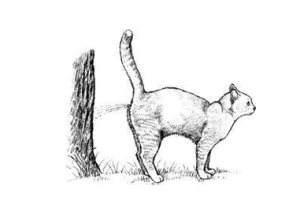The Classic Comprehensive Handbook of Cat Care
DIGESTIVE SYSTEM (GASTROINTESTINAL TRACT)
URINE SPRAYING
Urine spraying is the act of squirting or spraying urine on vertical (rarely horizontal) surfaces in response to territorial stimuli, particularly the smell of other cats. This is a normal behavior for unneutered adult male cats, but a behavior almost all cat owners find undesirable. It can usually be prevented or arrested by castration. Female cats and castrated males who have never sprayed before sometimes start spraying (or habitually urinating in abnormal places) at an advanced age. Usually this occurs as the result of some environmental change, such as the presence of a new cat in the house or even a change in the owner’s routine. It may, however, be associated with a urinary tract disease such as cystitis. In females it is occasionally associated with incomplete neutering since urine spraying is a normal behavior for some females in heat (estrus). Sometimes spraying is associated with defecation outside the litter box because cats occasionally use uncovered feces to mark their territorial boundaries.
The best course of action to follow when a cat suddenly starts abnormal urination behavior, such as spraying, is to have the cat examined by a veterinarian who can perform a complete urinalysis. If physical examination and urinalysis reveal no abnormalities, then you and the veterinarian can work together in an attempt to find and solve the behavioral problem.
The most successful solutions to spraying problems in cats who have already been neutered usually involve reducing the number of cats in a household and/or eliminating the spraying cat’s exposure to other cats he or she can see outdoors, since the sight of another cat through a window or screened porch will trigger spraying in some individuals. Simply keeping the window blinds closed may discourage spraying behavior in some cats. However, the scents and sounds of unseen cats may continue to cause problems. Male cats even if neutered are more likely to spray (and fight) if housed with females (spayed or not) than if housed with other males.
It is also important to provide a clean, easily accessible litter pan containing attractive litter material that will encourage the cat to empty his or her bladder (and bowels) completely in an appropriate place. At the same time, the urine-sprayed area needs to be made less desirable.
Clean up all urine odor from the marked spot. Use vinegar and detergent in water, commercial pet odo, removers, club soda, or a baking soda and water rinse following detergent cleaning to remove urine odor. Do not use ammonia-based cleaners, which seem to smell like urine to cats. Make the site itself unattractive by using booby traps. Hanging strips of aluminum foil frighten some cats away because they make a sound when urine is sprayed against them. Two-sided sticky tape or sheets of plastic wrap or aluminum foil placed on the cat’s approach to the spraying site discourage others. Some cats will avoid areas that smell of citrus so a few peels can be left in previously sprayed areas. Heavily scented perfumes or rubbing alcohol have a similar effect, especially after a dab has been rubbed on the offending cat’s nose. To use punishment to discourage spraying, stand ready with a plant mister or water pistol to administer a squirt to the face when the cat approaches the favored spraying area. Motion-sensing burglar alarms set up in the areas can also administer effective punishment in your absence by making a frightening noise when the cat approaches. Keep in mind that while effective for some cats, punishment and booby traps may cause additional stress for others and may just result in a more disturbed and insecure pet who chooses a new site for urine spraying.
Occasionally tranquilizers (e.g., diazepam) and/or progesterone-like hormone drugs are administered by veterinarians to help break the behavior pattern of spraying. If such treatments are effective for your cat, and you know that he or she is one who begins urine (or stool) marking whenever a new stress arises, these drugs can be given prophylactically anytime the cat must be moved to a new house, experience a change in routine, or endure the introduction of a new cat, dog, or human to his or her territory. Intractable cases of urine spraying have caused veterinarians to resort to surgical procedures in an attempt to stop the problem. In one, olfactory tractotomy, the cat’s sense of smell is eliminated by destroying a portion of the brain. Such mutilating surgeries should be considered only as an extreme last resort, since a cat’s sense of smell is one of the major ones he or she uses to relate to the surrounding world. A more natural solution is to give the cat free access to the outdoors via a fully enclosed run that gives a permissible place to mark territory.
